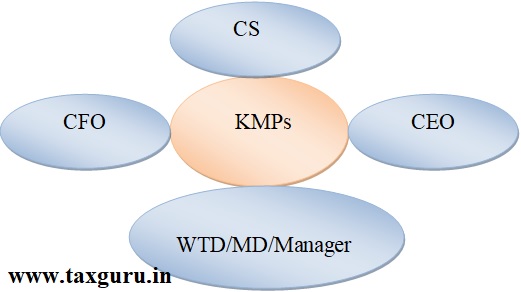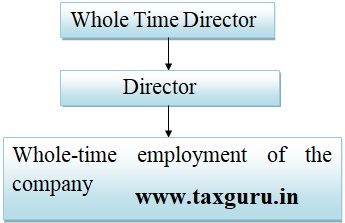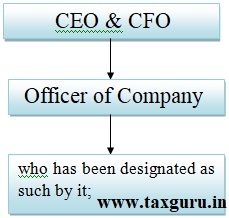Extract of Definition of Key Managerial Personnels (KMPs) under Section 2 of Companies Act 2013
Section 2(51) ‘key managerial personnel’, in relation to a company, means—
(i) the Chief Executive Officer or the managing director or the manager;
(ii) the company secretary;
(iii) the whole-time director;
(iv) the Chief Financial Officer;
(v) such other officer, not more than one level below the directors who is in whole-time employment, designated as key managerial personnel by the Board; and
(vi) such other officer as may be prescribed
Section 2(18) “Chief Executive Officer” means an officer of a company, who has been designated as such by it;
Section 2(19) “Chief Financial Officer” means a person appointed as the Chief Financial Officer of a company;
Section 2(24) “company secretary” or “secretary” means a company secretary as defined in clause (c) of sub-section (1) of section 2 of the Company Secretaries Act, 1980 (56 of 1980) who is appointed by a company to perform the functions of a company secretary under this Act;
Section 2(53) “manager” means an individual who, subject to the superintendence, control and direction of the Board of Directors, has the management of the whole, or substantially the whole, of the affairs of a company, and includes a director or any other person occupying the position of a manager, by whatever name called, whether under a contract of service or not;
Section 2(54) “managing director” means a director who, by virtue of the articles of a company or an agreement with the company or a resolution passed in its general meeting, or by its Board of Directors, is entrusted with substantial powers of management of the affairs of the company and includes a director occupying the position of managing director, by whatever name called.
Explanation.—For the purposes of this clause, the power to do administrative acts of a routine nature when so authorised by the Board such as the power to affix the common seal of the company to any document or to draw and endorse any cheque on the account of the company in any bank or to draw and endorse any negotiable instrument or to sign any certificate of share or to direct registration of transfer of any share, shall not be deemed to be included within the substantial powers of management;
Section 2(94) “whole-time director” includes a director in the whole-time employment of the company;
Section 2(54) of the Companies Act, 2013
Section 2(94) of the Companies Act, 2013
Whole Time Director
Section 2(53) of the Companies Act, 2013
Manager
Section 2(18)/(19) of the Companies Act, 2013
CEO & CFO
Section 2(24)of the Companies Act, 2013
Company Secretary
Appointment of Managing Director, Whole-Time Director or Manager.
Section-196 of the Companies Act, 2013
1. No company shall appoint or employ at the same time a Managing Director and a Manager.
Further, a company shall not appoint or reappoint any person as its Managing Director, Whole Time Director or manager for a term exceeding five years at a time and no reappointment shall be made earlier than one year before the expiry of his term.
2. Section 196(4) of the Companies Act, 2013 provides that subject to the provisions of section 197 and Schedule V-
i. a managing director,
ii. whole-time director or
iii. manager
shall be appointed and the terms and conditions of such appointment and remuneration payable be –
i. approved by the Board of Directors at a meeting ,
ii. Which shall be subject to approval by a resolution at the next general meeting of the company and
iii. By the Central Government in case such appointment is at variance to the conditions specified in Schedule V.
iv. Approval of the Central Government is not necessary if the appointment is made in accordance with the conditions specified in Schedule V to the Act.
1. Approval in the Meeting
The appointment of a managing director or whole-time director or manager and the terms and conditions of such appointment and remuneration payable thereon must be first approved by the Board of directors at a meeting and then by an ordinary resolution passed at a general meeting of the company.
2. Notice for Convening Meeting
A notice convening Board or general meeting for considering such appointment shall include the terms and conditions of such appointment, remuneration payable and such other matters including interest, of a director or directors in such appointments, if any.
3. Form- MR-1 to be filed with ROC.
A return in the prescribed form viz. MR.1 is required to be filed with Registrar within 60 days from the date of such appointment.
Appointment with the approval of the Central Government
When provision contained in Schedule V not complied by the Company
An application seeking approval to the appointment of a managing director (Whole-time director or manager) shall be made to the Central Government, in e-Form No. MR.2.
Points to be considered by the Central Government before approval
(a) The financial position of the company;
(b) The remuneration or commission drawn by the individual concerned in any other capacity;
(c) The remuneration or commission drawn by him from any other company;
(d) Professional qualifications and experience of the individual concerned;
(e) Such other matters as may be prescribed. Refer Rule 6 of Companies (Appointment and Remuneration of Key Managerial Personnel), Rules, 2014.
Reappointment of Managing Director
Relevant Section: Section 196 and Section 203 of the Companies Act, 2013
1. Under sections 196 and 203 of the Companies Act, 2013, appointment includes reappointment. Reappointment of a managing director of a company must be taken for consideration before the expiry of his term of office.
2. If the reappointment of the managing director is approved and if it is not in accordance with the conditions specified in Schedule V then the approval of the Central Government must be obtained for such reappointment.
3. Rest of the provisions for reappointment of a managing director are same as in the case of appointment of a managing director.
Appointment of KMPs
Relevant Section: Section 203 of the Companies Act 2013
Relevant Rule: Rule 8
the appointment of Key Managerial Personnel and makes it obligatory for a listed company and every other public company having a paid-up share capital of rupees ten crores or more, to appoint following whole-time key managerial personnel:
(i) Managing director, or Chief Executive Officer or manager and in their absence, a whole-time director;
(ii) Company secretary; and
(iii) Chief Financial Officer:
Rule 8A of Companies (Appointment and Remuneration of Managerial Personnel) Rules, 2014
Every Company (Private Company or Unlisted Public Company) having Paid Up Share Capital of INR 10.00 Crore or more have to appoint Whole Time Company Secretary. (Amended as on 03-01-2020)
1. Approval in the Board Meeting
Every whole-time key managerial personnel of a company shall be appointed by means of a resolution of the Board containing the terms and conditions of the appointment including the remuneration.
2. Individual not to be appointed in more than 1 capacity
1. An individual shall not be appointed or reappointed as the chairperson of the company, as well as the managing director or Chief Executive Officer of the company at the same time unless the articles of such a company provide otherwise; or
2. The company does not carry multiple businesses. However, such class of companies engaged in multiple businesses and which has appointed one or more Chief Executive Officers for each such business as may be notified by the Central Government are exempted from the above
WTD shall not hold office at same time in two or more Companies
1. A whole-time key managerial personnel shall not hold office in more than one company except in its subsidiary company at the same time. However, he can hold such other directorship with the permission of the Board.
2. A whole-time key managerial personnel holding office in more than one company at the same time, shall, within a period of six months from such commencement, choose one company, in which he wishes to continue to hold the office of key managerial personnel.
A company may appoint or employ a person as its managing director, if he is the managing director or manager of one, and of not more than one, other company and such appointment or employment is made or approved by a resolution passed at a meeting of the Board with the consent of all the directors present at the meeting and of which meeting, and of the resolution to be moved thereat, specific notice has been given to all the directors then in India.
If the office of any whole-time key managerial personnel is vacated, the resulting vacancy shall be filled-up by the Board at a meeting of the Board within a period of six months from the date of such vacancy.











